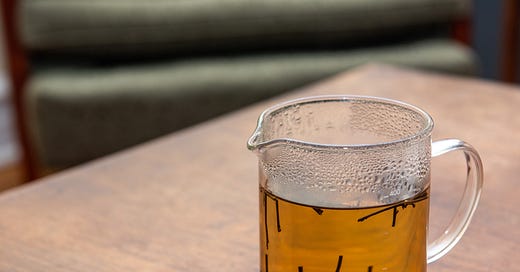Self-steeping stems
The tea: Malawi Satemwa Antlers white tea, sold by What-Cha. $42.64 for 100g.
Continuing Leafhopper’s pursuit of teas made from stems and interesting brews from Africa, these unusual “antlers” are worth a look. White tea is made by plucking fresh leaves and simply drying them. Subtle oxidation during this drying encourages soft fruity and floral flavors to develop in the leaf. Sometimes the leaves are dried under the sun, sometimes in air-circulated ovens. Point is, they’re not messed with much, and the resulting tea has a suitably “natural” taste at home with a bowl of muesli and dried fruit. There is ludicrously expensive white tea made with tiny unopened buds (tastes like the world’s best marshmallows) and dirt cheap white tea made with mature late harvest leaves (tastes like the world’s best pile of autumn leaves). This tea is somewhere in between.
Producers of premium orthodox teas that are surrounded by cheap commodity growers have to distinguish themselves to survive. Why should someone buy their tea when their neighbor sells a version for one-tenth the price? The Satemwa Estate in Malawi is the only garden making a white tea like this, with downy young stems plucked from a patch of tea plants whose broken twigs yield an alluring apricot fragrance. Small batches make for a higher price than I’d like, but I enjoy the brew’s woodsy, honeyed verve and gentle stimulation, owing to minimal caffeine in the stems. I tend to drink lighter teas as the weather warms in springtime, and this one hits right. There’s no other white tea quite like it.
The source: The Satemwa Estate is a multi-faceted garden in Malawi that’s been run by the Kay family since the 1920s, when the Scotsman Maclean Kay bought the land from a tobacco grower. They grow a diverse range of herbs, coffee, and tea on the property, including traditional orthodox black tea and crush-tear-curl teabag fodder for the big European companies. They do other experimental teas in addition to the antlers, too, and have a number of sustainability and community development initiatives. Many sellers carry their antlers—just search online for the name. What-Cha is a British vendor with a focus on teas from unsung regions including Malawi, Nepal, and Vietnam. It’s a fun shop to get a sense of the broader tea landscape.
To brew: I like this tea best when brewed casually in a larger pot or bowl. Since there’s no leaves, the tea doesn’t really oversteep. Brew with boiling water and infuse for 2 to 3 minutes for notes of pear and apricot with a lasting fresh finish. As the stems sit, woody and honey flavors emerge, gaining a juicy, tangy streak and a subtle tongue-tingling astringency. It’s perfect office tea: easy to brew and sip while multitasking, interesting but not too demanding, and broadly likable enough to share with coworkers. The empty cup smells of cocoa nibs. That’s nice, too.
Introducing “Ask a Tea Person”: I need help getting into tea!
When I launched Leafhopper, one of my goals was to make this place feel like a message from your own personal tea friend. Today we’re making that goal more literal. “Ask a Tea Person” will be an occasional advice series featuring questions from readers. To submit your own, email max.falkowitz@gmail.com with “Ask a Tea Person” in the subject line. We’re beginning with a question close to my heart, from a reader who wants to become his own tea person, but has struggled with getting started.
Hi Max, I’m a mostly coffee drinker who signed up for your newsletter because I’d like to get more into tea, but there’s so much out there I’m not sure where to start. I like reading your tasting notes and learning about different styles. However I worry I won’t get the nuances of a tea you like or that I have to buy special equipment to brew it. A lot of the teas you feature are expensive and feel like a risky investment. Do you have any suggestions of teas I could try to dip my toes in the water? — Roger A.
Keep reading with a 7-day free trial
Subscribe to Leafhopper to keep reading this post and get 7 days of free access to the full post archives.







